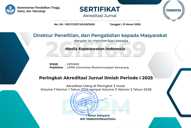Self-Control as a Protective Factor Against Self-Harm Behavior in Adolescents
(1) Universitas Udayana
(2) Universitas Udayana
(3) Universitas Udayana
(4) Universitas Udayana
(*) Corresponding Author
Abstract
Keywords
Full Text:
PDFReferences
Ruskandi JH. Kecemasan Remaja pada Masa Pandemi COVID-19. JPPP 2021;3:483–92. https://doi.org/10.29210/120202592.
Adolescent health. WHO 2024. https://www.who.int/health-topics/adolescent-health/#tab=tab_1 (accessed May 14, 2024).
Jaakallio P, MD, Kuula L, PhD, Pesonen AK, Professor. Temporal pathways between circadian rhythm, depression and anxiety in the transition from adolescence to early adulthood. Journal of Affective Disordersof Affective Disorders 2024;350:656–64. https://doi.org/10.1016/j.jad.2024.01.141.
(WHO) WHO. Mental health of adolescents. World Health Organization 2024. https://www.who.int/news-room/fact-sheets/detail/adolescent-mental-health.
Rizki AN, Padilah FI, Rahma R, Nurfalah ST. Pengaruh Kaderisasi terhadap Kesehatan Mental Mahasiswa Baru Fakultas Pendidikan Olahraga dan Kesehatan Universitas Pendidikan Indonesia. Kesehatan Masyarakat Indonesia 2024;1:29–33. https://doi.org/10.62017/jkmi.
Gintari KW, Jayanti DMD, Laksmi IGAP, Sintari SNN. Kesehatan Mental Pada Remaja. Jurnal NURSEPEDIA 2023;2:167–83. https://doi.org/10.55887/nrpm.v2i3.49.
Wardani IY, Nasution RA, Panjaitan RU, Suratmini D, Rusiana E. Analysis of factors self-harm behaviour among adolescents undergoing drug rehabilitation in Indonesia. Jurnal Ners 2024;19:216–21. https://doi.org/10.20473/jn.v19i2.52823.
Rahmadaningtyas F, Pratikto H. Efektivitas Self Talk Therapy Pada Perilaku Self Injury. BK Pendidikan Islam 2020;1:9–20. https://doi.org/10.1905/ec.v1i2.3716.
Sabrina VA, Afiatin T. Peran Disregulasi Emosi terhadap Kecenderungan Melakukan Perilaku Nonsuicidal Self-Injury (NSSI) pada Remaja. GamaJoP 2023;9:192–214. https://doi.org/10.22146/gamajop.79558.
Swieten M V, Nijman I, Looff PD, VanDerNagel J, Didden D. A systematic review of studies on the association between physiological parameters and self-harm. Research in Developmental Disabilities 2025;162:1–15. https://doi.org/10.1016/j.ridd.2025.105010.
Prasetyo MP, Engry A. Hubungan antara Dukungan Emosional dengan Perilaku Menyakiti Diri (Self-injury) pada Pengguna Media Sosial Twitter. Psychopreneur Journal 2023;7:89–97. https://doi.org/10.37715/psy.v7i2.3461.
Komariah F. 49 Anak Sekolah Lakukan “Self Harm”, Menteri PPPA: Miris, Mereka Ikuti Tren Media Sosial. Radio Republik Indonesia (RRI) 2023. https://www.rri.co.id/nasional/192308/kemenpppa-prihatin-puluhan-anak-di-bali-self-harm (accessed May 14, 2024).
Puteri AP, Dewi DK. Hubungan antara kontrol diri dan dukungan sosial dengan motivasi belajar pada Mahasiswa Psikologi Universitas Negeri Surabaya. Jurnal Penelitian Psikologi 2021;8:1–13. https://doi.org/10.26740/cjpp.v8i6.41517.
Sulistiana D, Arumsari C, Mutmainah M. Profil Kontrol Diri Remaja Pada Siswa Di Tiga Sma Kecamatan Cigalontang Dan Implikasinya Dalam Bimbingan Dan Konseling. Of Innovative Counseling 2022;6:36–46.
Erpansyah Y, Suryati, Jannati Z. Layanan Konseling Individu Dengan Teknik Self Management Untuk Meningkatkan Kontrol Diri (Studi Kasus Pada Klien “A” Di Yayasan Mitra Mulia Banyuasin). Pendidikan Sosial Dan Konseling 2023;1:176–80. https://doi.org/10.47233/jpdsk.v1i2.129.
Pardede AB, Mandang JH, Kumaat TD. Self-Control Remaja Yang Melakukan Self-Harm Di Kota Bitung. Psikopedia 2022;3:79–85. https://doi.org/10.53682/pj.v3i2.5651.
Rini. Perilaku Menyakiti Diri Sendiri: Bentuk, Faktor dan Keterbukaan Dalam Perspektif Perbedaan Jenis Kelamin. L IKRAITH-HUMANIORA 2022;6:115–23.
Arifin HH, Mirra MN. Adaptasi dan properti psikometrik skala kontrol diri ringkas versi Indonesia. Psikologi Sosial 2020;18:179–95. https://doi.org/doi: 10.7454/jps.2020.18.
Rizqi T MI. Pengaruh kematangan emosi terhadap kecenderungan perilaku Self Injury pada Remaja. UIN Syarif Hidayatullah Jakarta, 2011.
Lubis IR, Yudhaningrum Y. Gambaran Kesepian Pada Remaja Pelaku Self-Harm. Penelitian Dan Pengukuran Psikologi 2020;9:14–21. https://doi.org/doi:10.21009/jppp.091.03.
Izzani TA, Octaria S, Linda. Perkembangan Masa Remaja. JISPENDIORA 2024;3:259–73. https://doi.org/10.56910/jispendiora.v3i2.1578.
Gea D, Lase F, Munthe M, Damanik HR. Pengaruh Layanan Bimbingan Kelompok , Kemampuan Berinteraksi Sosial , Kontrol Diri dan Peningkatan Kualitas Kegiatan Belajar terhadap Motivasi Berprestasi dalam Belajar. Jurnal on Education 2024;06:16383–96. https://doi.org/10.31004/joe.v6i3.5517.
Tambayong MJ, Hartati ME, Sengkey SB. Perbedaan Kontrol Diri Remaja Dalam Lingkungan Sosial di Desa Kali Selatan Kabupaten Minahasa Berdasarkan Karakteristik Jenis Kelamin. Psikopedia 2022;3:187–93.
Khairunnisa MS, Anggraini PG, Lesmana G. Teknik Konfrontasi dalam Alur Self-Control untuk Meningkatkan Kestabilan Emosi Siswa dalam Bergaul (Studi Kuantitatif pada Anak Usia SD). Research and Education Studies 2025;5.
Helviani M, Syahriman, Herawati AA. Tingkat Kontrol Diri Remaja Awal Dalam Bermain Media Sosial Facebook Di Desa Daspetah Kabupaten Kepahiang. Jurnal Ilmiah Bimbingan Dan Konseling n.d.;5:135–46.
Kurnia S, Sitasari NW, S M. Kontrol Diri dan Perilaku Phubbing pada Remaja di Jakarta. Jurnal Psikologi 2020;18:58–67.
Hidayati LN, Amalia R. Psychological Impacts On Adolescent Victims Of Bullying: Phenomenology Study. Media Keperawatan Indonesia 2021;4:201–7. https://doi.org/10.26714/mki.4.3.2021.201-207.
Haghish EF. Differentiating adolescent suicidal and nonsuicidal self-harm with artificial intelligence: Beyond suicidal intent and capability for suicide. Journal of Affective Disorders 2025;378:381–91. https://doi.org/10.1016/j.jad.2025.02.015.
Putri VR, Hariko R, Nirwana H, Sano A. Gambaran Sikap terhadap Self-Injury pada Siswa SMP. Pendidikan Tambusai 2024;8:35323–9.
Wulan N, Nugraha MD. Hubungan antara jenis kelamin dengan self harm pada remaja generasi z di sekolah menengah atas. Of Nursing Practice and Education 2024;5:140–6. https://doi.org/10.34305/jnpe.v5i1.1450.
Rahmatika S, Syahidin. Mengatasi Self-Harm di Kalangan Remaja: Pendekatan Pendidikan Karakter dalam Perspektif Islam. Jurnal Riset Sosial Humaniora Dan Pendidikan 2024;2:177–84. https://doi.org/10.62383/risoma.v2i4.140.
Yosep I, Mardhiyah A, Suryani, Hikmat R, Kurniawan, Purnama H. Experiences of mental health nurses who give nursing intervention among child and adolescent with cyberbullying: a qualitative study. BMC Nursing 2025;24:527. https://doi.org/10.1186/s12912-025-03182-x.
Article Metrics
Abstract view : 132 timesPDF - 1 times
DOI: https://doi.org/10.26714/mki.8.2.2025.125-133
Refbacks
- There are currently no refbacks.
Copyright (c) 2025 Putu Siska Dewi, Ni Made Dian Sulistiowati, Putu Ayu Sani Utami, Kadek Eka Swedarma

This work is licensed under a Creative Commons Attribution 4.0 International License.
This journal is indexed by:
Kedungmundu Raya No. 18 Semarang NRC Building Universitas Muhammadiyah Semarang
Phone: 02476740287
Fax: 02476740287
Email: mki@unimus.ac.id





















